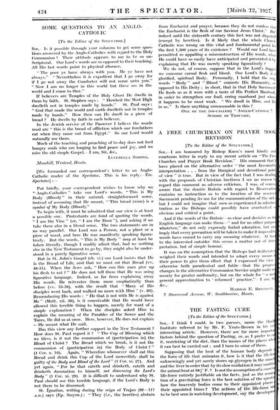SOME QUESTIONS . TO AN ANGLO- CATHOLIC [To the Editor
of the SeEcTATon.] . .
Sin,— Is it possible through your columns to get some ques- tions answered by the Anglo-Catholics with regard to the Holy Communion ? Their attitude appears to me to he so un- Scriptural. Our Lord's words are so opposed to their teaching. MI His last words point to physical absence.
"The poor ye have always with you. Me ye have not always." "Nevertheless it is expedient that I go away for if I go not away the Comforter will not come unto you." "Now I am no longer in this world but these are in the world and I come to thee."
If believers are Temples of the Holy Ghost He dwells in them by faith. St. Stephen says : "Howbeit the Most High dwelleth not in temples made by hands." St.. Paul says : "God that made the world and earth dwelleth not in temples made by hands." How then can He dwell in a piece of bread ? He dwells by faith in each believer.
In the Jewish service of the Passover I believe the words used are "this is the bread of affliction which our forefathers eat when they came out from Egypt." So our Lord would naturally use them.
Much of the teaching and preaching of to-day does not feed hungry souls Who are longing to find peace and joy, and we miss the old simple Gospel.-4 am, Sir, &c.,
LUCEBELLA STRONG. .
[We forwarded our correspondent's letter to an Anglo7 Catholic reader of the Spectator. This is his reply.— -En. Spectator] :— Put briefly, your correspondent wishes to know why we " Anglo-Catholics " take our Lord's words, "This is My Body (Blood) " in their natural, straightforward sense, instead of assuming that lie meant, "This bread (wine) is a symbol of My Body (Blood)."
To begin with, it must be admitted that our view is at least a possible one. Protestants are fond of quoting the words, "I am the Vine" (or, "I am the Door "), and asking if we take these also in a literal sense. The two statements are in no way parallel. Our Lord was a Person, not a plant or a piece of wood, and here He was manifestly speaking figura- tively. But the words, "This is My Body" may at least be taken literally, though I readily admit that, had we nothing else in the New Testament to go by, they might also be under- stood in a purely figurative sense.
But in St. John's Gospel (eh. vi.) our Lord insists that He is the Bread of Life, and that we must eat that Bread (vv, 48-51). When the Jews ask, "How can this man give up his flesh to cat ? " He does not tell them that He was using figurative language. Indeed, so far from explaining away His words, He reiterates them more emphatically than before (vv. 53-58), with the result that "Many of His disciples went back, and walked no more with Him" (v. 66). Remembering His words :.." He that is not with Me is against Mc" (Matt. xii. 30), is it conceivable that He would have allowed this terrible thing to happen, merely_ for want of a simple explanation ? When the disciples asked Him to explain the meaning of the Parables of the Sower and the Tares, He did so at once. Here, however, He does not explain —He meant what He said.
Has this view any further support in the New Testament ? How does St. Paul regard it ? "The Cup of Blessing which we bless, is it not the communion of (participation in). the Blood of Christ ? The Bread which we break, is it not the communion of (participation in) the Body. of Christ?" (1 Cor.. N. 16). Again, ".Wherefore whosoever shall eat this Bread and drink this Cup of the Lord unworthily .shall be guilty of the Body and Blood of the Lord" (1 Coy. xi. 27). And yet again, "For he that eateth and drinketh, eateth and drinketh damnation to himself, not discerning the Lord's Body" (1 Cor. xi. 29). It is difficult to understand why St. Paul should use this terrible language, if the Lord's Body is not there to be discerned.
St. Ygnatius, writing during the reign of Trojan (08-1,17 A.D.) says (Ep. Srnyrn.) : "They (i.e., the heretics) abstain from Eucharist and prayer, because they do not confess that the Eucharist is the flesh of our Saviour Jesus Christ." But indeed until the sixteenth century this fact was not disputed (except by heretics). Is it likely that the .whole Church
Catholic was 'wrong on this vital and fundamental point for
the first 1,500 years of its existence ? Would our Lord have permitted so appalling a misconstruction of His words, when He could have so easily have anticipated and prevented it by explaining that He was merely speaking figuratively ?
We do not, of course, suppose that in the Lord's Supper we consume carnal flesh and blood. Our Lord's Body is 4 glorified, spiritual Body. Personally, I bold that the yeti words " Body " and "Blood" connote His Humanity, as opposed to His Deity ; in short, that in that Holy 'Sacrament He feeds us as it were with .a. taste of His Perfect Manhood, in order to strengthen' our frail, erring- manhood just where
it happens to be most weak. We dwell in Him, and lie in us." Is there anything unreasonable in this ?
ONE OF TILE (SO-CALLED) " ANGLO-C..1.7110M '! SCHOOL' OF TIIOUGHT.






























































 Previous page
Previous page